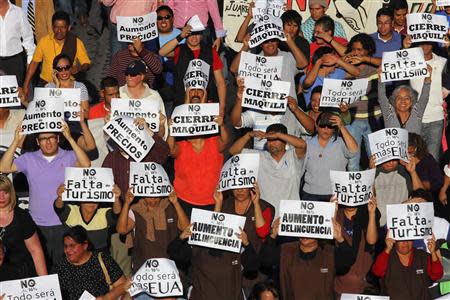Mexico ruling party ready to back higher junk food tax: lawmaker
By Dave Graham and Miguel Gutierrez MEXICO CITY (Reuters) - Mexico's ruling Institutional Revolutionary Party (PRI) is ready to support an opposition proposal to increase a planned tax on junk food included in the government's fiscal reform, the PRI's leader in the Senate said on Wednesday. Last week, the lower house of Congress approved President Enrique Pena Nieto's fiscal reform, at the last minute adding a measure to impose a 5 percent tax on junk food. The Senate must approve the reform by the end of the month. This week Armando Rios Piter, a Senate finance expert from the leftist Party of the Democratic Revolution (PRD), proposed increasing the tax rate on junk food to 8 percent. Asked whether the PRI could back the higher tax proposed by Rios Piter, which also aims to reduce high levels of obesity in Mexico, the party's Senate leader Emilio Gamboa told Reuters: "The PRI will undoubtedly support it." Gamboa noted the finance committee of the Senate was still discussing the fiscal reform, and its decision on possible changes to the bill is not expected until later this week. The tax bill is a key plank of a government reform agenda spanning energy to telecommunications that Pena Nieto hopes will boost growth in Latin America's No.2 economy. Any changes to the bill would mean returning it to the lower house of Congress to be signed off, and would expose it to fresh attacks from the conservative National Action Party (PAN), which has waged a vigorous campaign against much of the tax reform. If the bill is approved as revised by the lower house, government tax revenues will rise by a little less than 2.7 percent of GDP by 2018, Miguel Messmacher, Mexico's deputy finance minister for revenue, told Milenio television. That is slightly less than the nearly 2.8 percent of GDP forecast previously by Finance Minister Luis Videgaray. More fighting over the tax bill risks complicating Pena Nieto's efforts to open up the oil industry to private capital, for which the PRI is likely to rely on support from the PAN. The PRI lacks a majority in Congress and needs a two-thirds majority for the constitutional changes Pena Nieto wants to make to foment outside investment in the state-run oil industry. DEFINING JUNK FOOD Separately, another PRI official, speaking on condition of anonymity, said the Senate was also considering expanding the basket of foods included under the junk food definition so as to reap more tax without necessarily raising the rate. The junk food tax, which compliments a planned charge on sugary drinks, is to be levied on high-calorie foods including chocolates, sweets, puddings, potato chips and ice cream. The definition does not, however, include hamburgers and tacos. The Senate is also discussing the option of rolling back a proposal to make investment outlays deductible from a planned 7.5 percent charge on mining firms' profits, lawmakers said. Also on Wednesday, the PRD's Senate leader Miguel Barbosa said his party was exploring the possibility of adding a measure to the tax reform to ensure the biggest companies operating in Mexico pay no less than 5 percent in tax on their income, putting deductions and tax breaks under the microscope. That, along with changes to the mining duty and the junk food tax could help improve tax revenues for Mexico, which has long suffered from one of the weakest tax takes in the Americas. However, Jose Trejo, a PAN lawmaker who heads the finance committee in the lower house, said the government was against making changes to the tax reform because time was running out. "If they send any reform back to the lower house, the time to discuss it is really short," he told Reuters. "It would be a problem for the government. The window closes on October 31." LOBBYISTS The PRD's Rios Piter estimates that an 8 percent junk food tax would bring in 5.6 billion pesos ($431.90 million) in revenue, versus around 3.5 billion pesos under a 5 percent rate. Rios Piter told Reuters he was confident his junk food amendment would pass, possibly even with some PAN support. Meanwhile, another part of the bill - that of increasing an 11 percent value-added tax rate for border states to match the national rate of 16 percent - is under attack. The PAN is already against raising the 11 percent border VAT rate and Barbosa, the PRD's Senate leader, has urged his party to vote against the measure. Others in the PRD, which mostly backed it in the lower house, lean towards supporting it. Lobbyists in Congress have also been pushing hard to roll back plans to apply sales tax to pet food, a Senate aide said. Parts of Pena Nieto's original bill have already been cut. Lawmakers have scrapped plans to apply sales tax to rents, mortgages, property sales and school fees in Mexico. But they agreed last week to raise the top income tax rate on a sliding scale to 35 percent from 30 percent. The tax bill is tied to the 2014 budget, which must be signed off on by mid-November. ($1 = 12.9659 Mexican pesos) (Editing by Simon Gardner; Editing by Jackie Frank and David Brunnstrom)


